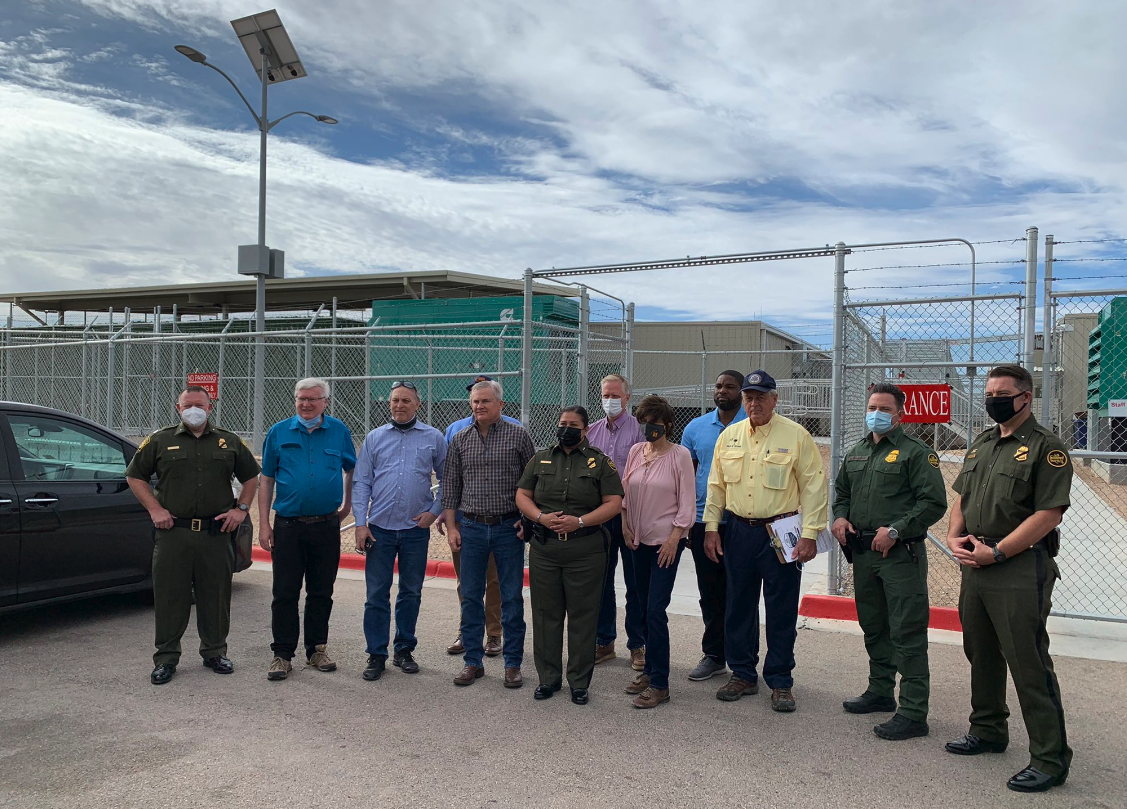
On Monday, April 12th, First Term Congresswoman Yvette Herrell (R-N.M.) organized a hands-on New Mexico/Mexico border outing for herself and eight members of the House Committee on Oversight and Reform. Herrell’s congressional district includes all of New Mexico’s approximate 180-mile long border with Mexico.
The Congresswoman’s goal in assembling the delegation was to illustrate first-hand that under the administration of President Joe Biden border issues are getting worse. While early in his presidency, Biden suggested he would be reversing many of the anti-immigration policies by the previous administration and set up a task force to reunite families separated at the border, he has not raised the refugee cap and is struggling with a backlog of visa applicants left to him by former President Trump.
Herrell and her eight colleagues, all members of the Committee on Oversight and Reform, toured both the Santa Teresa and the Columbus Ports of Entry. They went to the El Paso Border Patrol Processing Center, as well as to a partially finished section of the border wall. They met with local officials and area ranchers, and finally, after dark, rode with representatives of the Border Patrol Council along the border near El Paso.
The delegation was composed of the Oversight Committee’s Ranking Member Congressman James Comer (R-Ky.) and Congressmen Andy Biggs (R-Ariz.), Byron Donalds (R-Fla.), Scott Franklin (R-Fla.), Glenn Grothman (R-Wis.), Fred Keller (R-Pa.), Jake LaTurner (R-Kan.) and Ralph Norman (R-S.C.).
The Committee on Oversight and Reform has broad investigative powers and, according to Congressman Comer, Republicans on the committee “… will continue working on behalf of Americans to ensure efficiency, effectiveness, and accountability of the federal government and provide a check and balance on the role and power of Washington.”
Congresswoman Herrell is concerned about President Biden’s executive actions to halt the construction of the border wall that separates New Mexico from Mexico. In a letter to Homeland Security Secretary Alejandro Mayorkas dated February 4, 2021, the Committee on Oversight and Reform states that Biden’s decision “… leaves American citizens living near the southwest border vulnerable to activities involving cartels and smugglers.
Last Friday on April 9th, Congresswoman Herrell asked the governor of New Mexico, Michelle Lujan Grisham, to send the New Mexico National Guard to protect the border between New Mexico and Mexico. In her letter Herrell stated: “Our state is on the front lines of President Biden’s border crisis and I am hearing from constituents on the border every day about the number of immigrants coming across their property. The problem is made all the worse by the unfinished sections of the border wall in New Mexico that are funneling migrants into our state.”
While Herrell has long been an adamant supporter of Trump’s proposed wall as a solution to America’s immigration issues, the majority of undocumented immigrants come through ports of entry and the current overflow of immigrants in processing facilities stems largely from visa and refugee applications, not illegal border crossing. COVID-19 pandemic restrictions are also a contributing factor to the backlog.
Although Governor Grisham’s office has said little in response to Herrell’s request, the governor of neighboring Arizona Doug Ducey is open to deploying his state’s National Guard. ABC 15 Arizona tweeted: “Governor Ducey says if necessary, he’s willing to spend state money to send the Arizona National Guard to the Mexico border to help with the recent increase in migrants crossing into the state.”
Even though Grisham and Ducey seem to have different ideas about dealing with issues along the border between the two states and Mexico, one thing is certain – migrant numbers are up. According to border patrol statistics, 173,731 migrants were encountered by agency officials last month. This figure is approximately 70,000 more than in March of 2019. It is more than 100,000 more that in March of 2020, when as a result of the COVID-19 pandemic, the number was 69, 271.


